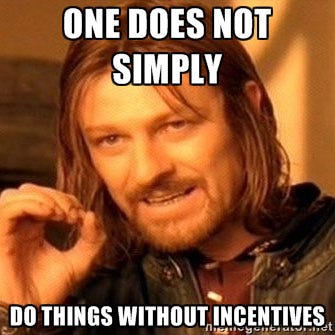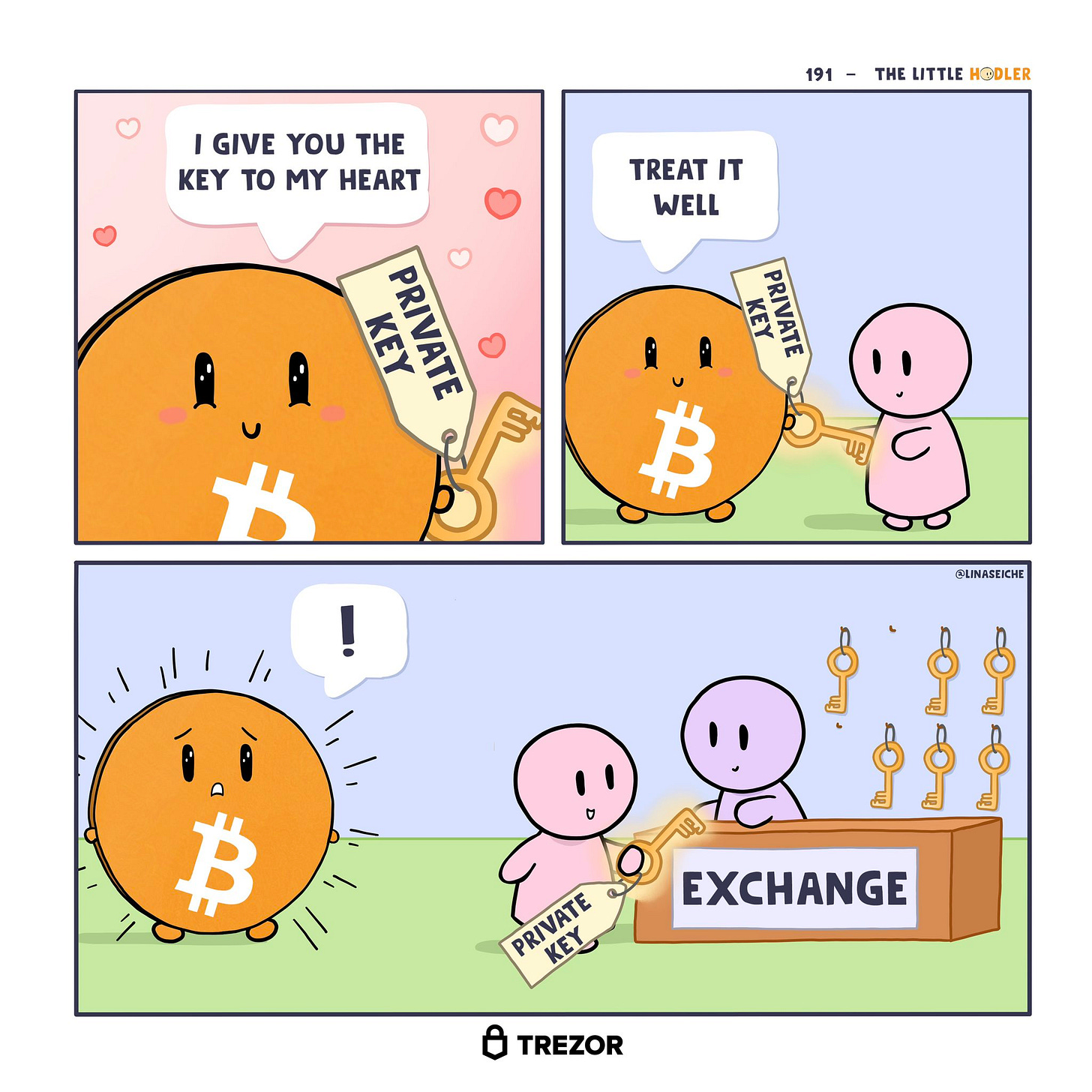Bitcoin Tech Talk #372
Interesting Stuff
Leisure, not Jobs - The article makes the case that you need to quit your job, lest you get too comfortable and live out a meaningless existence. That is, of course, standard fare for fiat money. But there’s a lot more here, particularly about leisure and how we need real leisure, not the doomscrolling consumptive fake leisure, but study in things that we find interesting. Last week’s article on Goodhart’s Law combined with this article is a potent mixture that has me re-thinking how I spend my time. The idea that the money I have needs me to give it a worthy purpose is a powerful north star, given the hard, undebaseable money I have. Make room, in other words, for leisure so that you can find your purpose.
Where are the Intellectuals? - The article starts with a lament about how nerd culture has become mainstream the last 25 years, largely because nerds have made all the money. But the deeper lament is about the vanishing of the intellectual, the firebrand, the cultural prophet. As the post argues, the smart have bifurcated into nerds and academics, the former going populist and the latter going political. What’s missing are the intellectuals, the people that are the consciences of civilization, the ones using art to communicate and inspire progress. Indeed, there hasn’t been much inspiring for quite a while and I suspect that this is part of fiat stagnation.
Lying about Beliefs - The article is an economic analysis of whether telling lies about what you believe is beneficial or not. As you might expect, a lot of people tell lies, specifically about what they perceive to be the dominant belief system. As I wrote about in Fiat Ruins Everything, this effect is amplified by nearly everything, especially access to loans, being tied to your job. As the article points out, there’s a psychological cost to lying constantly about your beliefs and that debasement of your inner being is a large contributor to unhappiness endemic in materially prosperous economies.
What I'm up to
Stagflation - I talked to Peter St. Onge about the current inflation that’s happening and the endgame for central banks. We discussed a lot of what happened in the 70’s and how that influences the policies that are happening now. We talked about the possible endgames given the massive amount of spending that governments, particularly, the US government is having and what the softest landing would be. Take a listen if you want the Austrian take on what’s going on.
Programming Blockchain Dubai - I will be running my Programming Blockchain seminar in Dubai in February! I haven’t run these publicly for over a year since I was traveling. The course covers the Bitcoin protocol from elliptic curve cryptography to transaction structure and proof-of-work calculations. If you are wanting to learn the intricacies of layer 1, apply today!
Unconfiscatable - I will be speaking at this conference Dec 7-8 in Las Vegas! The steak dinner is pretty amazing and the venue is made for conventions. The highlight is the Scammy Awards, which resulted in the unbelievable shilling of MimbleWimble coin by Trace Mayer 3 years ago. I’ll have some copies of my book for sale, so stop by if you want to hang out!
Nostr Note of the Week
What I’m Promoting
Unchained Capital is a sponsor of this newsletter. I am an advisor and proud to be a part of a company that’s enhancing security for Bitcoin holders. If you need multisig, collaborative custody or bitcoin native financial services, learn more here.
Bitcoin
Mining Problems - GrassFedBitcoin outlines a lot of the incentive problems of the current mining ecosystem. The post gets technical, particularly with respect to mining payouts, but as he points out, there are games that pools can play to seem below the 51% threshold without being so. There are also problems with block withholding attacks which can be rational at a certain pool size. There are many other problems discussed and various protocols being analyzed, but in the end, as the post implies, we need a better system to keep Bitcoin decentralized.
Pools Filtering Txs - Some of these problems are starting to come to pass as 0xB10C reports that pools have filtered some transactions based on the OFAC sanctions list. This isn’t just a single pool, but ViaBTC, F2Pool and FoundryUSA, though the only one doing it consistently is F2Pool. F2Pool disabled the patch soon after, but the fact that this is happening is concerning, as many miners don’t really care about the OFAC sanctions as long as they get paid. That said, there is a cost to not mining these lucrative transactions, so the pools will need to be compensated the fee amount by somebody if it’s to be economically viable.
Detecting CoinJoins - A new paper purports to have figured out some heuristics to detect coinjoin transactions. While CoinJoins help with privacy for the end user, identifying them isn’t difficult according to this paper. CoinJoin operators would do well to look at the heuristics used in the paper to see if there are ways to defeat them. They cover, among other things, Wasabi and Samurai wallet coinjoins.
Lightning
circuitbreaker - Mitigating against DoS attacks on a lightning node can be tricky since it’s possible to just keep sending data to your node. Mitigating that is the focus of this project, specifically to limit the amount of in-flight HTLCs. For routing nodes in particular, defending against such attacks will become critical as routing becomes more competitive and nodes will have to be more strict about who they open channels with if they get cut off for flooding. This is in general a good thing as decentralized enforcement of standards is much likelier to succeed in this environment.
Wallet of Satoshi - This popular Bitcoin wallet is no longer available in the US on either Android or iOS. Speculation is that because they are custodial, they don’t want to deal with the stringent KYC requirements imposed on them from the federal government. As is the case of anything centralized, there are some existential risks of running afoul of local laws. Thankfully, there are lots of non-custodial solutions that will thankfully pick up the slack.
BOLT12 Addresses - Lightning addresses and BOLT12 have been seen in the past as somewhat conflicting, especially given that there are camps on both sides here. This is a proposal to add something like LN addresses to the BOLT12 standard, with the nice property that there doesn’t have to be a server negotiation for an invoice like you have with LNURL. The main idea is that there’s an address proof that can be issued and then sent along with the address, which means that you wouldn’t have to contact the server at all.
Economics, Engineering, Etc.
Going First - Parker Lewis has written a fantastic analysis of how Bitcoin adoption actually occurs. Unlike the VC model, which is largely based on marketing, Bitcoin is based on individual decisions, which happens based on individual conviction, not whim, as is the case on so many fiat money decisions. The main idea is that the next person to adopt Bitcoin as a payment will do so because it’s a good store of value and it becomes a balance sheet decision.
CZ out as CEO - CZ has a deal in place to plead guilty, get $4.3B in fines, and possibly serve up to 18 months in prison, and thus has stepped down as CEO. This is an object lesson in how the winds of political influence shift. This was a guy gloating over the collapse of FTX a year and a half ago and someone that made billions selling scamcoins. Centralization leaves you very vulnerable and despite being very profitable, the scams have caught up with him. The crackdown on altcoins may finally come this cycle, and it’s not going to be pretty for the many, many people that profited enormously in the previous cycles.
The Case for Timelock Multisig - Athena Bitcoin makes the case for more usage of timelock multisig, which to my knowledge hasn’t been implemented in any consumer wallets. The logic is that timelocks make stealing much harder than even normal multisig by adding a time element to your UTXOs. This functionality has been around since the advent of OP_CLTV, which was activated back in 2015, but so far, there hasn’t been much interest in implementing multisig timelocked UTXOs. Perhaps liquidity is valued by most people more than security, though I suspect there’s a spectrum and there exist people that would use that functionality if given to them.
Quick Hits
Milei wins - Libertarian candidate Javier Milei wins in Argentina! His first order of business? Closing down their central bank.
83 BTC Fee - To my knowledge this is the biggest brain fart that anyone has had. It’s unclear whether this fee will be returned, but I’m sure people will be looking at it closely.
Kraken and the SEC - Binance isn’t the only one under investigation. It looks like Kraken is under investigation as well.
IMF CBDC Handbook - Fittingly, the IMF has a CBDC handbook available for interested central banks.
Fiat delenda est.








